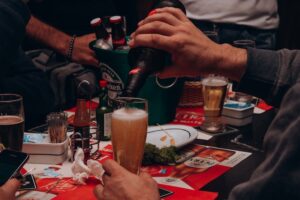 Fundacion Diagrama intervenes in addictions, from a biopsychosocial model and a multidisciplinary approach, through the development of different initiatives in prevention, rehabilitation, awareness, and family, social, and labor insertion.
Fundacion Diagrama intervenes in addictions, from a biopsychosocial model and a multidisciplinary approach, through the development of different initiatives in prevention, rehabilitation, awareness, and family, social, and labor insertion.
These areas of action and the programs that are carried out in them are included in the Helianthus Project, an extensive system that facilitates the care of people with addiction problems throughout their entire rehabilitation and reintegration process, in line with the principles contained in the National Plan on Drugs and in the National Institute on Drug Abuse (NIDA).
This innovative project, certified with the ISO 9001:2015 Standard and in the Region of Murcia with the NGO Quality Standard Version 5 by the Institute for the Quality of NGOs (ICONG), allows each user to receive support from the different communication devices. Those available (psychological and educational assistance, support for families, job placement…) to achieve greater autonomy in life. In this sense, it uses a network methodology that contributes to improving communication and coordination with the specific resources that each beneficiary needs (health centers, drug intervention, care centers, intervention services, Likewise, it reinforces the preventive aspects of intervention in this matter by developing different health promotion activities aimed at young people and adolescents.
Rehabilitation Area
Day Center ‘Heliotropes.’ Located in Murcia. From this resource, we work to facilitate the cessation and rehabilitation of people with addiction problems. An evaluation of the psychological, social, health, and educational factors that affect each person is carried out, and an individualized care plan is drawn up that includes a tutorial action plan (pre-employment workshops, sports…), a treatment plan (individual, group, and family) and an itinerary of social and labor insertion. Subsidized by the Murcian Health Service of the Ministry of Health, the Murcian Institute for Social Action (IMAS) of the Ministry of Social Policy, Families and Equality, and the Murcia City Council, which also finances its catering service.
Addiction Intervention Program. Therapeutic intervention carried out in the Social Integration Centers of Murcia, Alicante, and Ciudad Real, as well as in the Educational Treatment Unit of the ‘Murcia II Penitentiary Center.
Outpatient Program. Individual, group, and family therapeutic intervention is compatible with work developed in the urban environment, mainly at night. Developed in the following provinces:
Psychotherapeutic support program for relatives of people with addiction and dual pathology problems. Meeting space between families that have a member with addiction problems so that they can receive information and advice to learn about the addictive process and adequately deal with situations arising from it. The objective is for the family to be an active part in recovering from their relative’s addiction through a psychoeducational intervention. It is financed by the Ministry of Health (Government Delegation for the National Plan on Drugs) and the Murcia City Council and included in the Outpatient Program in Murcia, Alicante, and Ciudad Real.
 Preventive Area
Preventive Area
Universal Program ‘Education for health.’ Oriented to acquiring and maintaining healthy behaviors, providing information on addictive behaviors. Aimed at young people and adolescents in the Region of Murcia without addiction problems.
Selective Program ‘Prevention of drug use in juvenile offenders and their families.’ It focuses on groups of young people and adolescents whose specific characteristics increase risk factors for addictive behaviors. Aimed at minors or young people in a situation of social exclusion who comply with judicial measures in educational centers managed by Fundacion Diagrama in the Region of Murcia.
Indicated Program ‘Competences: young people and Family.’ Designed for youth with addictive behaviors. It has been taking place since 2013 at the ‘Heliotropos Day Center, aimed at young people and their families in whom addiction begins to be a problem on a physical, psychological, and social level.
